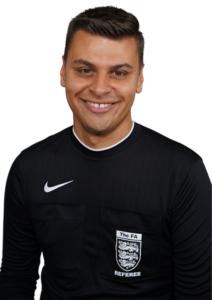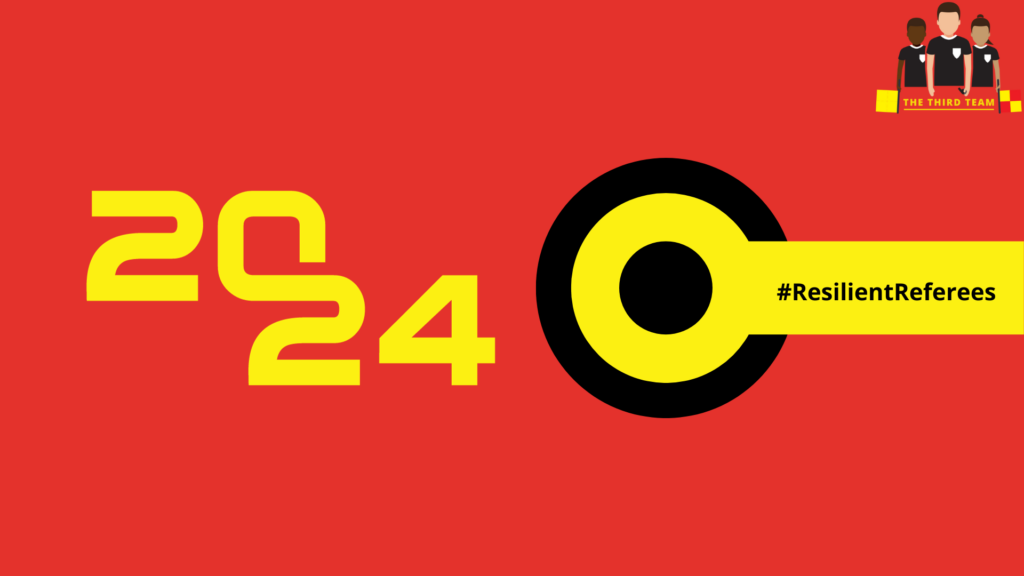Christmas is over, 2023 has come to an end and with the turn of the year, we feel inspired to break old habits and set some new goals. Some may dismiss New Year’s resolutions as clichéd and outdated, but it’s hard to deny that the turn of the year marks a milestone. This milestone provides an ideal basis for positive changes to be made.
What goals are referees setting for the coming year?
The top 5 most popular New Year’s resolutions for 2024 are as follows:
Saving more money is one of the most important resolutions for 51% of respondents.
48% want to officiate more games next year.
46% want to eat more healthily.
38% plan to spend more time with their loved ones.
37% want to become fitter in 2024.
Other popular resolutions include drinking less alcohol and having less stress at work. The resolution to spend less time on social media is also represented this year.
Looking at these statistics, it is noticeable that a significant proportion of the resolutions have to do with mental and physical health. We are probably all aware of the importance of regular exercise in order to be in peak condition for refereeing. The immune system gets strengthened, the risk of illness is reduced, wellbeing and mental health are improved, as an official, you generally live better and longer.
Your health is important to us at The Third Team. That’s why we want to support you as much as possible in achieving your refereeing goals with the following tips and tricks and a guide to effective goal setting.
3 Reasons Why Many Referees Fail
First things first, even the best resolution is doomed to failure if don’t set your goals the right way. The following three factors play a major role in a lack of motivation.
Lack of goal setting. If your goal is not specific enough, it will be extremely difficult not to lose sight of it over the course of the remaining season. Find out below how to set SMART, concise goals.
No routine. You decide what the routines in your life are. It would be unthinkable to skip brushing your teeth, right? The same can also apply to officiating. New training regimes need to be actioned at least 1-2 times a week, for six weeks, until the sessions become a habit and committed to memory.
Perfectionism. Last but not least, perfectionism is a killer for motivation. The need to do something “right or not at all” unfortunately leads to “not at all” more often than we would like. So if you’re a perfectionist, you don’t have to run the best time in your first training session for the fitness test.
A Detailed Guide On How To Plan SMART Goals
The following step-by-step guide is designed to help you avoid the problems mentioned above and make the perfect plan for your refereeing in 2024.
Step 1: Make A List
Before you set your resolutions for next year, it can be worth making a list of your goals, wishes and dreams. These can be all kinds of goals in your officiating career. Think about which fitness or milestone goal is really important to you.
Do you want to become fitter? Or gain a promotion on your refereeing ladder? Or do you simply want to integrate more exercise into your everyday life? The motivation, ambition or anticipation that the goal evokes in you are decisive for success in this first step.
Step 2: Define a SMART goal
Once you have roughly outlined what is important to you in the first step, the second step is to take a closer look at your goals. Is your goal a larger project that lies a little further in the future? Or something that you can achieve in a few small steps?
It’s worth using the SMART rule to set yourself a well-formulated, specific goal. SMART stands for the following characteristics:
Specific (the goal must be precisely formulated)
Measurable (the achievement or non-achievement of the goal must be measurable)
Appealing (the goal should be attractive, it should motivate you)
Realistic (it should be feasible)
Time-bound (a deadline must be set for achieving the goal)
So, an example of bad goal-setting would be: “I want to officiate a cup final.”
An example of a SMART goal is: “I want to referee the [COMPETITION] Cup Final on [DATE & TIME]. To achieve this, I will train at least [FREQUENCY] per week and officiate [FREQUENCY] games per week from [MONTH] to [MONTH].” Of course, refereeing a Cup Final is an extreme example, the SMART rule can be applied to any resolution. However, remember that your resolutions should be realistic goals that you can actually achieve. Goals that are set too high can have a demotivating effect.
Tip: Write the goal on a piece of paper and pin it up somewhere where you will always see it.
Step 3: Set Progress Goals And Celebrate The Small Wins
Progress goals are small milestones on the way to your goal. They serve as motivation on the one hand and as self-monitoring on the other. Are you still on the right track? Do you need to adjust your goal? You should also use the achievement of an progress goal as an opportunity to reward yourself! Perhaps with a new piece of kit for officiating, a gourmet meal or an activity that you particularly enjoy?
With this plan, you are perfectly equipped to achieve your goals. If you need extra motivation to referee, read on.
9 Tips For Enhancing Your Motivation To Referee
Find motivation through others. Team up with friends, family members and colleagues to work towards your fitness goals together. The advantage is not only that doing sessions with other people is more fun, but also that you can motivate and push each other.
Define the “why”. Why have you resolved to perform at a higher level physically this year? Are you doing it to become generally healthier, to gain a promotion, to be appointed to a Cup Final? It’s best to be more specific about your why. Example: I want to train to become more efficient on the field of play so that I can move about the pitch with ease.
Motivating music. The right soundtrack makes all the difference. It gives you energy, makes training more enjoyable and has been proven to boost your performances. The right music can work wonders, especially during running or weight training.
Tip: There are various sports playlists on Spotify, Apple or Amazon Music that will bring the right rhythm to your preparations on matchday and in the gym or at the track.
Eliminate obstacles. There are one or two stumbling blocks that can get in the way of your motivation to train. With the right planning, however, you can quickly clear them out of the way. Bad weather conditions? Think about a bad weather plan in advance, if you usually train outside. That way, you have no excuse in the event of rain or snow. No time? Understandably, sometimes life gets in the way. But it’s always worth reminding yourself that training for matchdays is worthwhile even in small time slots of 10 to 20 minutes. It’s the little things in life that count. No kit? The old shorts with holes in them may not be the outfit that motivates you to perform at your best. It’s worth investing in a few suitable basics that are comfortable and make you feel good while exercising.
Document your progress. Unfortunately, we are often a little pessimistic and tend to remember our setbacks rather than our progress. That’s why it’s all the more important to document our progress and note our refereeing successes.
Good nutrition. Food plays an important role in achieving your fitness targets. Do you want to build muscle? Or become lighter on your feet? The right diet is essential for both goals. What’s more, regardless of the fixtures you’re training for, you need enough energy to keep going. A nutritious, balanced diet is therefore essential.
Adequate recovery. Routine training is important, yes, but so is sufficient rest. Give yourself a break from the new training regime and allow your body time to regenerate.
Keep sore muscles at bay. We’ve all been there, you’re eager to start training and go full force, only to be slowed down by extreme muscle soreness for several days afterwards. Contrary to popular belief, sore muscles are not a sign of particularly effective training, rather, they are a symptom of abrupt physical overexertion. In many cases, muscle soreness can be kept to a minimum by slowly increasing the intensity of your training.
Avoid injuries. Even more troublesome than sore muscles are injuries. The result? Your routine is halted and your motivation disappears, as you may have to take a break for several months. Injuries to the musculoskeletal system often require extensive physiotherapy.
With good planning and these 9 tips, nothing will stand between you and your goals for this year. Are you ready for an active 2024?
At The Third Team I work individually and in collaboration with different professionals where I have developed workshops and 1-2-1 sessions associated with Resilience and Mental Toughness Development to help referees. The workshops and 1-2-1 sessions are interactive, where referees are encouraged to open up and share their experiences to help themselves and each other.
Feel free to contact me if you’d like to know more about my workshops or 1-2-1 sessions and how I could help you or your officials.
Best Wishes,

Nathan Sherratt
Referee Educator & Managing Director of The Third Team

Nathan Sherratt
Nathan Sherratt, Referee Educator, Resilience Trainer and Managing Director of The Third Team. A Mental Toughness Practitioner based in Tyne & Wear, North East England.

